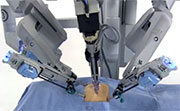No differences in blood loss, complication rates, survival for morbidly obese, lower-weight patients
TUESDAY, June 30, 2015 (HealthDay News) — Robotic surgery is safe and feasible for the surgical management of morbidly obese patients with endometrial cancer, according to research published in the July issue of the American Journal of Obstetrics & Gynecology.
Jean-Marie Stephan, M.D., from the University of Iowa in Iowa City, and colleagues performed a retrospective chart review of 168 patients with suspected early-stage endometrial adenocarcinoma who underwent robotic surgery. Patient characteristics and surgical variables were compared across all body weights.
The researchers found that the mean body mass index (BMI) was 40.9 kg/m², and 56 patients were supermorbidly obese with a BMI of ≥50 kg/m², 30 percent of whom had grade 2 or 3 tumors. Patients were followed for a median of 31 moths. There were no differences in terms of length of hospital stay, blood loss, complication rates, numbers of pelvic and paraaortic lymph nodes retrieved, or recurrence and survival between supermorbidly obese and lower-weight patients. BMI was positively associated with conversion to an open procedure, with the odds of conversion increasing with increasing BMI (P = 0.02).
“Offering robotic surgery to supermorbidly obese patients with endometrial cancer is a safe and feasible surgical management option,” the authors write.
Copyright © 2015 HealthDay. All rights reserved.








